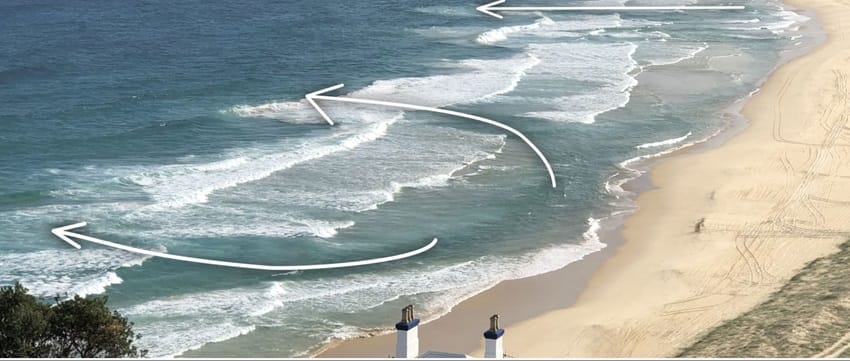‘If unsure, don’t exit’ that’s the seaside security message these Summer time holidays.
Considering of swimming at unpatrolled seashores this summer time? Don’t do it till the dangers says Dr Rip.
Professor Rob Brander – aka Dr Rip – a surf scientist with UNSW Sydney’s Faculty of Organic, Earth and Environmental Sciences, has studied the rip present hazard on seashores from each bodily and social science views for the previous 30 years
“If unsure, don’t exit.”Dr Rip, aka Prof. Rob Brander
“For those who’re alone on the seaside, and there’s nobody round, and also you’re not a surfer or an skilled ocean swimmer, and also you suppose it may be OK to go within the water – don’t!
“For those who get caught in a rip, there’s nobody going to have the ability to prevent. So if unsure, don’t exit.”
Easy methods to spot a rip on the seaside
White is sweet, inexperienced is imply
What makes rips notably harmful is at first look, lots of them appear to be seemingly calm, darker patches of water.
Many individuals arrive on the seaside and assume the darker, greener areas are the most secure place to swim as a result of there are not any waves breaking there.
However the actuality is that breaking waves and whitewater imply that it’s shallower and that whitewater is transferring water onshore. These darker, inexperienced gaps between the whitewater imply it’s deeper and might be rip currents that take you out to sea. One technique to keep in mind it’s utilizing the saying: white is sweet, inexperienced is imply.

“The unhappy factor about rip currents,” says Prof. Brander, “is they’re doubtlessly avoidable. However on common, 25 to 30 individuals tragically drown yearly in Australia every year after being caught in rips. That’s extra on common than the variety of fatalities per 12 months attributable to cyclones, bushfires, floods and sharks mixed. Rip currents are a giant deal.
“The easy reality is, when you don’t get in a rip present, you received’t drown in a single.”
Sorts of rip currents
Listed below are the three completely different sorts of rip currents.

- The most typical rip and the best to identify are those that sit in deep channels between shallow sandbars. These channelised rips appear to be darkish gaps between areas of whitewater and breaking waves.
Channelised rips could be in the identical place for days, weeks and even months, and are the best to identify. Typically, you don’t simply get one channelised rip as they happen alongside the seaside at various intervals.

- Boundary rip currents are one other widespread kind of rip, that additionally often occupy deeper channels, however they happen subsequent to headlands, rock outcrops, or human-made buildings like piers, jetties and groins. Water flowing alongside the seaside will hit these rocky options or buildings and might be deflected offshore.
Boundary rips could be virtually everlasting, in reality, we regularly give them names – such because the ‘Backpacker Categorical’ at Bondi in Sydney or the close by ‘Bronte Categorical’. Surfers use boundary rips to get shortly out past the breakers, however swimmers can simply get into hassle in the event that they get caught in them by swimming too near the rocks.
“Some boundary rips are nice for surfers who get a free experience out the again to catch waves, however they’re not good for swimmers, who could also be fooled by the calmer wanting waters,” Prof. Brander says.
“By way of security on the seaside, you actually don’t wish to be swimming wherever close to rocks, headlands, or buildings.”

- The ultimate kind of rip is a flash rip. These rips are completely different as a result of they don’t sit in deep channels and don’t appear to be darkish gaps.
They’re additionally widespread, however happen shortly and don’t final lengthy, which makes them laborious to identify. Right here’s some examples from Coogee Seashore in Sydney and Metropolis Seashore in Perth.
Prof. Brander says flash rips are attributable to some random giant waves, or a set of bigger waves, that break, which makes them unattainable to foretell and really troublesome to review.
“Now and again notably when the waves are messy, you get a few huge waves break, the water piles up and it pushes a rip present out referred to as a flash rip. You’ll see the turbulent whitewater, you’ll see clouds of sand going out to sea and if anybody’s in that area, they will simply be caught and brought offshore.
“A flash rip might solely final for a minute or so after which it disappears. However others can shortly develop elsewhere alongside the seaside. They’re very troublesome to identify as a result of they kind shortly and don’t final very lengthy. So it’s one thing you ought to be conscious of, and likewise keep in mind they will additionally typically kind off the again of sandbars.”
What to do when you get caught in a rip

When you’re in water over your waist, the hazard of being taken by a rip rises dramatically. It’s best to all the time make sure that your toes are firmly on the sand, notably if you’re not a very good swimmer.
For those who do end up caught in a rip, there are a couple of key issues it’s best to do, says Prof. Brander.
- Chill out!
There’s a saying that ‘Rips don’t drown individuals, individuals drown in rips’. The primary cause for that’s many individuals panic once they realise they’re caught in a rip. Panic is the actual hazard.
“You actually don’t must panic as a result of rips are simply taking you for a experience,” Prof. Brander says.
“Rips don’t pull you beneath the water. That’s a fantasy – there’s no such factor as an undertow. They don’t take you throughout the ocean they usually aren’t taking you into shark-infested waters. They’re simply taking you for a experience and there’s a very good likelihood they may re-circulate again into shallower water.”
- Don’t swim towards it.
For most individuals once they get caught in a rip, their first intuition is to swim again to the security of the seaside.
“However meaning you’re swimming towards the rip, which is flowing very quick and doubtless quicker than most individuals can swim,” Prof. Brander says.
“Swimming towards the rip will simply tire you out and result in panic.”
“They don’t take you throughout the ocean they usually aren’t taking you into shark-infested waters. They’re simply taking you for a experience.”
- Float
The perfect factor to do when caught in a rip present is to drift.
“For those who loosen up and float, by treading water, and even mendacity in your again, you’re conserving your power,” Prof. Brander says.
“Ultimately the rip will cease flowing, often simply past the breaking waves and sometimes rips can re-circulate you round again into shallower water.”
The normal recommendation has all the time been to swim parallel to the seaside to flee a rip, however that solely applies to robust swimmers and is difficult by the truth that not all rips movement straight offshore. It’s all the time higher to drift.
- Sign for assist
So that you’re not panicking, you’re not swimming towards the rip again to the seaside and also you’re floating. The following factor to do is to sign for assist. Are there lifeguards, lifesavers, or surfers close by? It’s time to boost your arm and wave it, or name out for assist.
“Surfers do loads of rescues they usually have a pleasant surfboard you possibly can maintain onto. So when you’re in hassle in a rip and there’s no lifeguards or lifesavers round, search for surfers and get their consideration.”
- If there’s no-one else on the seaside…
In case you are caught in a rip and there’s no one else round to assist, then you’ve got a giant downside.
“As harsh because it sounds, you actually shouldn’t have gone within the water within the first place,” says Prof. Brander.
In these instances, he says, the perfect factor to do is to drift and keep calm, even when the rip has taken you out behind the breakers. There’s a very good likelihood that somebody will finally see you.
“The opposite choice is to swim alongside the seaside a good method after which again into shore. Search for areas the place there are many waves breaking and goal for that.
“However that’s solely if you’re a powerful swimmer, as a result of it’s going to contain a protracted and laborious swim.”
It actually does come all the way down to ‘If unsure, don’t exit’.

Dr Rip’s recommendation for bystander rescues
- Don’t rush in.
- Name for assist if doable. Or get somebody to go get assist. There may be an Emergency Response Beacon on the seaside.
- Look on the seaside for a floatation system or something that floats. There may be public rescue tools accessible. If you’re going to go within the water, you will need to deliver one thing that floats.
- If you’re going to go and assist the individual, don’t run or swim as quick as you possibly can – it’s good to preserve power.
- While you get to the individual, try to get them to remain calm. Guarantee them that every one they must do is float. For those who introduced one, use your floatation system to help them (and also you).
- Wave for assist, or if there’s no one else round, attempt to slowly transfer your self and the individual you’re rescuing in the direction of areas of breaking waves – this could point out an space of shallower water and the breaking waves might help you get again to shore.
How To Recognise If Your Little one Is Drowning
Drowning Indicators You Want To Look Out For:
- Head low within the water, mouth at water degree
- Head tilted again with mouth open
- Eyes glassy and empty, unable to focus
- Eyes closed
- Hair over brow or eyes
- Not utilizing legs—vertical
- Hyperventilating or gasping
- Attempting to swim in a specific route however not making headway
- Attempting to roll over on the again
- Seem like climbing an invisible ladder
If unsure, don’t exit (unsw.edu.au) due to Dr Rip.
Able to Drop a Gown Dimension in 28 Days?
By no means Go Hungry
Our program gives NO 1200 calorie restrictions
Exercise at House
Observe guided coaching movies with professional health instructors (no tools wanted!)
Really feel Supported 24/7
In our non-public help teams with different mums similar to you!
Eat Scrumptious and Wholesome Meals
With family-friendly, weekly meal plans & over 6,000 simple recipes developed by nutritionists
No lock-in contracts, cancel anytime.


